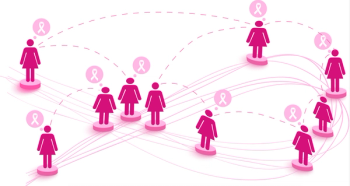
Lisa Laudico provides insight into the value of support groups in metastatic breast cancer.

Lisa Laudico provides insight into the value of support groups in metastatic breast cancer.

Julie Larson, LCSW, discusses the concept of self-inventory and questions patients may ask themselves to evaluate their health.

When you’re forced into menopause at an early age, you aren’t as prepared for the changes it brings. A woman with metastatic breast cancer explains the difficulties of medically induced menopause.

The rate of treatment discontinuation with Soltamox increased from 15.8% at one year after breast cancer diagnosis to 48.3% at five years, although more research is needed into why this is occurring.

Medically underserved and minority breast cancer survivors experienced improved outcomes and quality of life after participating in community-based physical activity programs, according to recent study results.

Even in the doctor’s office, the words patients hear can cover up the realities of stage 4 breast cancer. “He thought he was offering hope but what he was doing was denying my reality and minimizing the deaths of so many people,” writes a woman with metastatic breast cancer.

A women describes how the difficulties of stage 0 breast cancer is still misunderstood by many.

More than 10 years of follow-up data have shown that combining Herceptin with chemotherapy is safer and more effective than chemotherapy alone in this patient population.

A stage 4 metastatic breast cancer survivor describes her experience with a clinical trials and how they changed the trajectory of her life.

Several breast cancer survivors share how they stay mentally strong while living with breast cancer.

From former New York Islanders hockey player Mike Bossy announcing that he has lung cancer to First Lady Jill Biden emphasizing the importance of breast cancer screenings, here’s what’s happening in the cancer landscape this week.

Combine a mother’s breast cancer diagnosis with her daughter’s comedy background — what do you get? A podcast that laughs in cancer’s face.

People living with metastatic breast cancer share highlights of their personal self-care strategies.

Julie Larson, LCSW, and a panel of women living with metastatic breast discuss the impact of the disease on mental health and resources to consider as a patient.

Elacestrant improved progression-free survival in patients with ER-positive/HER2-negative advanced or metastatic breast cancer.

A patient turned to yoga during treatment for breast cancer and is now helping others do the same.

Talking with a doctor about costly cancer treatments and being frank with health care teams can ease financial distress for patients with cancer.

Yvonne Orji, actress and comedian from HBO’s “Insecure” discussed the racial disparities for Black women who receive a diagnosis of triple-negative breast cancer.

Oncologists are learning that cancer can be treated during pregnancy with relative safety in the second and third trimester.

A woman with metastatic breast cancer looks back on the happy memories she made this summer and how she uses them as strength in the face of cancer. “Sometimes, when we’re lucky, the scale tips toward the good,” she writes.

A mother of three who received a diagnosis of stage 4 breast cancer right before the pandemic shares what her must-have comfort and entertainment items are in her treatment bag.

October reminds us that men get breast cancer, too. A male breast cancer survivor shares his thoughts about Breast Cancer Awareness Month. “Controversy creates conversation, and conversation incites action,” he writes.

From Berner’s cancer diagnosis to lipstick art for cancer fundraising, here’s what’s happening in the cancer landscape this week.

Three therapeutic breakthroughs are revolutionizing care for triple-negative breast cancer and saving women’s lives.

Meet Jazmine Sullivan: singer-songwriter, BET award winner and breast cancer advocate.